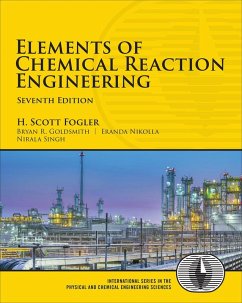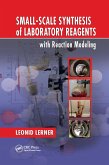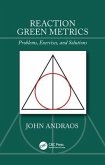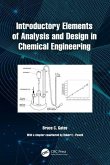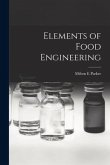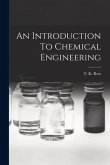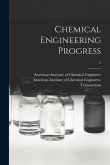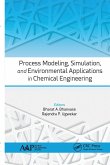- Broschiertes Buch
- Merkliste
- Auf die Merkliste
- Bewerten Bewerten
- Teilen
- Produkt teilen
- Produkterinnerung
- Produkterinnerung
The Essential Textbook for Mastering Chemical Reaction Engineering--Now Fully Updated with Expanded Coverage of Electrochemical Reactors H. Scott Fogler's Elements of Chemical Reaction Engineering, now in its seventh edition, continues to set the standard as the leading textbook in chemical reaction engineering. This edition, coauthored by Bryan R. Goldsmith, Eranda Nikolla, and Nirala Singh, still offers Fogler's engaging and active learning experience, with updated content and expanded coverage of electrochemical reactors. Reflecting current theories and practices, and with a continuing…mehr
Andere Kunden interessierten sich auch für
![Small-Scale Synthesis of Laboratory Reagents with Reaction Modeling Small-Scale Synthesis of Laboratory Reagents with Reaction Modeling]() Leonid LernerSmall-Scale Synthesis of Laboratory Reagents with Reaction Modeling92,99 €
Leonid LernerSmall-Scale Synthesis of Laboratory Reagents with Reaction Modeling92,99 €![Reaction Green Metrics Reaction Green Metrics]() John AndraosReaction Green Metrics154,99 €
John AndraosReaction Green Metrics154,99 €![Introductory Elements of Analysis and Design in Chemical Engineering Introductory Elements of Analysis and Design in Chemical Engineering]() Bruce C GatesIntroductory Elements of Analysis and Design in Chemical Engineering99,99 €
Bruce C GatesIntroductory Elements of Analysis and Design in Chemical Engineering99,99 €![Elements of Food Engineering Elements of Food Engineering]() Milton E ParkerElements of Food Engineering27,99 €
Milton E ParkerElements of Food Engineering27,99 €![An Introduction To Chemical Engineering An Introduction To Chemical Engineering]() An Introduction To Chemical Engineering23,99 €
An Introduction To Chemical Engineering23,99 €![Chemical Engineering Progress; 5 Chemical Engineering Progress; 5]() Chemical Engineering Progress; 526,99 €
Chemical Engineering Progress; 526,99 €![Process Modeling, Simulation, and Environmental Applications in Chemical Engineering Process Modeling, Simulation, and Environmental Applications in Chemical Engineering]() Process Modeling, Simulation, and Environmental Applications in Chemical Engineering110,99 €
Process Modeling, Simulation, and Environmental Applications in Chemical Engineering110,99 €-
-
-
The Essential Textbook for Mastering Chemical Reaction Engineering--Now Fully Updated with Expanded Coverage of Electrochemical Reactors H. Scott Fogler's Elements of Chemical Reaction Engineering, now in its seventh edition, continues to set the standard as the leading textbook in chemical reaction engineering. This edition, coauthored by Bryan R. Goldsmith, Eranda Nikolla, and Nirala Singh, still offers Fogler's engaging and active learning experience, with updated content and expanded coverage of electrochemical reactors. Reflecting current theories and practices, and with a continuing emphasis on safety and sustainability, this edition includes expanded sections on molecular simulation methods, analysis of experimental reactor data, and catalytic reactions. Leveraging the power of Wolfram, Python, POLYMATH, and MATLAB, students can explore the intricacies of reactions and reactors through realistic simulation experiments. This hands-on approach allows students to clearly understand the practical applications of theoretical concepts. This book prepares undergraduate students to apply chemical reaction kinetics and physics to the design of chemical reactors. Advanced chapters cover graduate-level topics, including diffusion and reaction models, residence time distribution, and tools to model non-ideal reactors. The seventh edition includes An expanded section on molecular simulation methods and potential energy surfacesUpdated examples of experimental reactor data and its analysisDetailed discussion of definitions in catalysis and examples of catalytic reactionsAdditional examples and an expanded section on surface reaction mechanisms and microkinetic modelingA new chapter on electrochemical reactors with example problems, reflecting the growing importance of this field in renewable energy and industrial processes About the Companion Web Site (umich.edu/~elements/7e/index.html) Comprehensive PowerPoint slides for lecture notes for chemical reaction engineering classesLinks to additional software, including POLYMATHTM, MATLABTM, Python, Wolfram MathematicaTM, AspenTechTM, and COMSOLTMInteractive learning resources linked to each chapter, including Learning Objectives, Summary Notes, Web Modules, Interactive Computer Games, Solved Problems, FAQs, additional homework problems, and links to LearnChemE and other resourcesLiving Example Problems provide interactive simulations, allowing students to explore the examples and ask "what-if" questionsProfessional Reference Shelf, which includes advanced content on reactors, weighted least squares, experimental planning, pharmacokinetics, detailed explanations of key derivations, and moreRedesigned Web site to increase accessibility Register your book for convenient access to downloads, updates, and/or corrections as they become available. See inside book for details.
Hinweis: Dieser Artikel kann nur an eine deutsche Lieferadresse ausgeliefert werden.
Hinweis: Dieser Artikel kann nur an eine deutsche Lieferadresse ausgeliefert werden.
Produktdetails
- Produktdetails
- Verlag: Pearson Education (US)
- 7. Auflage
- Seitenzahl: 1136
- Erscheinungstermin: 8. März 2025
- Englisch
- ISBN-13: 9780135337554
- ISBN-10: 0135337550
- Artikelnr.: 70200246
- Herstellerkennzeichnung
- Libri GmbH
- Europaallee 1
- 36244 Bad Hersfeld
- gpsr@libri.de
- Verlag: Pearson Education (US)
- 7. Auflage
- Seitenzahl: 1136
- Erscheinungstermin: 8. März 2025
- Englisch
- ISBN-13: 9780135337554
- ISBN-10: 0135337550
- Artikelnr.: 70200246
- Herstellerkennzeichnung
- Libri GmbH
- Europaallee 1
- 36244 Bad Hersfeld
- gpsr@libri.de
H. Scott Fogler was the Ame and Catherine Vennema Professor of Chemical Engineering and the Arthur F. Thurnau Professor at the University of Michigan. He was 2009 President of the American Institute of Chemical Engineers. Fogler chaired ASEE's Chemical Engineering Division, served as director of the American Institute of Chemical Engineers, and earned the Warren K. Lewis Award from AIChE for contributions to chemical engineering education. He received the Chemical Manufacturers Association's National Catalyst Award and the 2010 Malcolm E. Pruitt Award from the Council for Chemical Research. Bryan R. Goldsmith is the Dow Corning Assistant Professor of Chemical Engineering at the University of Michigan, Ann Arbor. He joined Michigan in 2017 after completing a Humboldt Postdoctoral Fellowship at the Fritz Haber Institute of the Max Planck Society in Berlin, Germany. He received his PhD in chemical engineering from the University of California Santa Barbara in 2015. His research lab specializes in atomistic modeling and machine learning to understand and design catalysts for chemical conversion, pollution reduction, and energy generation and storage. He was a recipient of the AIChE 35 under 35 Award and the ACS OpenEye Outstanding Junior Faculty Award. Eranda Nikolla is a professor in the Department of Chemical Engineering at the University of Michigan and is Materials Science Editor of the Journal of Catalysis. She received MS and PhD degrees from the University of Michigan and was a postdoctoral scholar in chemical engineering at the California Institute of Technology from 2009-2011. Her research lab focuses on studying issues related to thermocatalysis and electrocatalysis for energy and chemical conversion and storage. Nirala Singh is an assistant professor of chemical engineering at the University of Michigan. He received a BSE in chemical engineering from the University of Michigan in 2009 and a PhD in chemical engineering from the University of California Santa Barbara in 2015.
Introduction xvii
About the Authors xxxi
Chapter 1: Mole Balances 1
1.1 The Rate of Reaction, rA 4
1.2 The General Mole Balance Equation (GMBE) 8
1.3 Batch Reactors (BRs) 11
1.4 Continuous-Flow Reactors 13
1.5 Industrial Reactors 24
1.6 And Now . . . A Word from Our Sponsor--Safety 1 (AWFOS-S1 Safety) 25
Chapter 2: Conversion and Reactor Sizing 37
2.1 Definition of Conversion 38
2.2 Batch Reactor Design Equations 38
2.3 Design Equations for Flow Reactors 41
2.4 Sizing Continuous-Flow Reactors 44
2.5 Reactors in Series 53
2.6 Some Further Definitions 64
2.7 And Now . . . A Word from Our Sponsor--Safety 2 (AWFOS-S2 The NFPA
Diamond) 68
Chapter 3: Rate Laws 77
3.1 Basic Definitions 78
3.2 The Rate Law 80
3.3 The Reaction-Rate Constant 90
3.4 Molecular Simulations 102
3.5 Present Status of Our Approach to Reactor Sizing and Design 109
3.6 And Now . . . A Word from Our Sponsor--Safety 3 (AWFOS-S3 The GHS
Diamond) 110
Chapter 4: Stoichiometry 123
4.1 Batch Reactors (BRs) 125
4.2 Flow Systems 131
4.3 Reversible Reactions and Equilibrium Conversion 144
4.4 And Now . . . A Word from Our Sponsor--Safety 4 (AWFOS-S4 The Swiss
Cheese Model) 149
Chapter 5: Isothermal Reactor Design: Conversion 161
5.1 Design Structure for Isothermal Reactors 162
5.2 Batch Reactors (BRs) 166
5.3 Continuous-Stirred Tank Reactors (CSTRs) 174
5.4 Tubular Reactors 184
5.5 Pressure Drop in Reactors 191
5.6 Synthesizing the Design of a Chemical Plant 214
5.7 And Now . . . A Word from Our Sponsor--Safety 5 (AWFOS-S5 A Safety
Analysis of the Incident Algorithm) 216
Chapter 6: Isothermal Reactor Design: Moles and Molar Flow Rates 235
6.1 The Moles and Molar Flow Rate Balance Algorithms 236
6.2 Mole Balances on CSTRs, PFRs, PBRs, and Batch Reactors 236
6.3 Application of the PFR Molar Flow Rate Algorithm to a Microreactor 240
6.4 Membrane Reactors 245
6.5 Unsteady-State Operation of Stirred Reactors 254
6.6 Semibatch Reactors 255
6.7 And Now . . . A Word from Our Sponsor--Safety 6 (AWFOS-S6 The BowTie
Diagram) 262
Chapter 7: Collection and Analysis of Rate Data 275
7.1 The Algorithm for Data Analysis 276
7.2 Determining the Reaction Order for Each of Two Reactants Using the
Method of Excess 278
7.3 Integral Method 279
7.4 Differential Method of Analysis 283
7.5 Nonlinear Regression 290
7.6 Reaction-Rate Data from Differential Reactors 295
7.7 Experimental Planning 304
7.8 And Now . . . A Word from Our Sponsor--Safety 7 (AWFOS-S7 Laboratory
Safety) 304
Chapter 8: Multiple Reactions 315
8.1 Definitions 316
8.2 Algorithm for Multiple Reactions 319
8.3 Parallel Reactions 322
8.4 Reactions in Series 331
8.5 Complex Reactions 341
8.6 Membrane Reactors to Improve Selectivity in Multiple Reactions 349
8.7 Sorting It All Out 354
8.8 The Fun Part 354
8.9 And Now . . . A Word from Our Sponsor--Safety 8 (AWFOS-S8 The Fire
Triangle) 355
Chapter 9: Reaction Mechanisms, Pathways, Bioreactions, and Bioreactors 373
9.1 Active Intermediates and Nonelementary Rate Laws 374
9.2 Enzymatic Reaction Fundamentals 383
9.3 Inhibition of Enzyme Reactions 397
9.4 Bioreactors and Biosynthesis 405
9.5 And Now . . . A Word from Our Sponsor--Safety 9 (AWFOS-S9 Process
Safety Triangle) 427
Chapter 10: Catalysis and Catalytic Reactors 447
10.1 Catalysts 447
10.2 Steps in a Catalytic Reaction 453
10.3 Synthesizing a Rate Law, Mechanism, and Rate-Limiting Step 469
10.4 Heterogeneous Data Analysis for Reactor Design 486
10.5 Reaction Engineering in Microelectronic Fabrication 497
10.6 Model Discrimination 500
10.7 Catalyst Deactivation 503
10.8 Reactors That Can Be Used to Help Offset Catalyst Decay 514
10.9 And Now . . . A Word from Our Sponsor--Safety 10 (AWFOS-S10 Exxon
Mobil Torrance Refinery Explosion Involving a Straight-Through Transport
Reactor [STTR]) 526
Chapter 11: Nonisothermal Reactor Design: The Steady-State Energy Balance
and Adiabatic PFR Applications 547
11.1 Rationale 548
11.2 The Energy Balance 549
11.3 The User-Friendly Energy Balance Equations 557
11.4 Adiabatic Operation 563
11.5 Adiabatic Equilibrium Conversion 572
11.6 Reactor Staging with Interstage Cooling or Heating 577
11.7 Optimum Feed Temperature 581
11.8 And Now . . . A Word from Our Sponsor--Safety 11 (AWFOS-S11 Acronyms)
585
Chapter 12: Steady-State Nonisothermal Reactor Design: Flow Reactors with
Heat Exchange 597
12.1 Steady-State Tubular Reactor with Heat Exchange 598
12.2 Balance on the Heat-Transfer Fluid 601
12.3 Examples of the Algorithm for PFR/PBR Design with Heat Effects 604
12.4 CSTR with Heat Effects 625
12.5 Multiple Steady States (MSS) 636
12.6 Nonisothermal Multiple Chemical Reactions 643
12.7 Radial and Axial Temperature Variations in a Tubular Reactor 658
12.8 And Now . . . A Word from Our Sponsor--Safety 12 (AWFOS-S12 Safety
Statistics) 658
Chapter 13: Unsteady-State Nonisothermal Reactor Design 687
13.1 The Unsteady-State Energy Balance 688
13.2 Energy Balance on Batch Reactors (BRs) 690
13.3 Batch and Semibatch Reactors with a Heat Exchanger 706
13.4 Nonisothermal Multiple Reactions 717
13.5 And Now . . . A Word from Our Sponsor--Safety 13 (AWFOS-S13 Safety
Analysis of the T2 Laboratories Incident) 729
Chapter 14: Mass Transfer Limitations in Reacting Systems 745
14A Mass Transfer Fundamentals 746
14.1 Diffusion Fundamentals 746
14.2 Binary Diffusion 750
14.3 Modeling Diffusion with Chemical Reaction 754
14.4 The Mass Transfer Coefficient 756
14B Applications 758
14.5 Mass Transfer to a Single Particle 758
14.6 The Shrinking Core Model 764
14C Packed-Bed Applications 769
14.7 Mass Transfer Limited Reactions in Packed Beds 769
14.8 Robert the Worrier 772
14.9 What If . . . ? (Parameter Sensitivity) 776
14.10 And Now . . . A Word from Our Sponsor--Safety 14 (AWFOS-S14 Sugar
Dust Explosion) 784
Chapter 15: Diffusion and Reaction 797
15.1 Diffusion and Reactions in Homogeneous Systems 798
15.2 Diffusion and Reactions in Spherical Catalyst Pellets 799
15.3 The Internal Effectiveness Factor 808
15.4 Falsified Kinetics 815
15.5 Overall Effectiveness Factor 817
15.6 Estimation of Diffusion- and Reaction-Limited Regimes 822
15.6.1 Mears Criterion for External Diffusion Limitations 822
15.7 Mass Transfer and Reaction in a Packed Bed 823
15.8 Determination of Limiting Situations from Reaction-Rate Data 829
15.9 Multiphase Reactors in the Professional Reference Shelf 830
15.10 Fluidized Bed Reactors 832
15.11 Chemical Vapor Deposition (CVD) 832
15.12 And Now . . . A Word from Our Sponsor--Safety 15 (AWFOS-S15 Critical
Thinking Questions Applied to Safety) 832
Chapter 16: Residence Time Distributions of Chemical Reactors 849
16.1 General Considerations 850
16.2 Measurement of the RTD 852
16.3 Characteristics of the RTD 859
16.4 RTD in Ideal Reactors 866
16.5 PFR / CSTR Series RTD 872
16.6 Diagnostics and Troubleshooting 875
16.7 And Now . . . A Word from Our Sponsor--Safety 16 (AWFOS-S16 Critical
Thinking Actions) 882
Chapter 17: Predicting Conversion Directly from the Residence Time
Distribution 893
17.1 Modeling Nonideal Reactors Using the RTD 894
17.2 Zero Adjustable Parameter Models 896
17.3 Using Software Packages Such as Polymath to Find Maximum Mixedness
Conversion 913
17.4 Tanks-in-Series One Parameter Model, n 916
17.5 RTD and Multiple Reactions 918
17.6 And Now . . . A Word from Our Sponsor--Safety 17 (AWFOS-S17 Brief Case
History on an Air Preheater) 923
Chapter 18: Models for Nonideal Reactors 935
18.1 Some Guidelines for Developing Models 936
18.2 Flow and Axial Dispersion of Inert Tracers in Isothermal Reactors 939
18.3 Flow, Reaction, and Axial Dispersion 943
18.4 Flow, Reaction, and Axial Dispersion in Isothermal Laminar Flow
Reactors and Finding Meno 947
18.5 Tanks-in-Series Model versus Dispersion Model 957
18.6 Numerical Solutions to Flows with Dispersion and Reaction 958
18.7 Nonisothermal Flow with Radial and Axial Variations in a Tubular
Reactor 962
18.8 Two-Parameter ModelsModeling Real Reactors with Combinations of Ideal
Reactors 970
18.9 And Now . . . A Word from Our Sponsor--Safety 18 (AWFOS-S18 An
Algorithm for Management of
Change (MoC)) 980
Chapter 19: Electrochemical Reactor Design 995
19.1 Uses of Electrochemical Reactions 995
19.2 Basic Definitions for Electrochemical Reactors 997
19.3 Modeling Isothermal Electrochemical Reactors 1018
19.4 Modeling Heat Effects in Electrochemical Reactors 1025
19.5 And Now . . . A Word from Our Sponsor--Safety 19 (Example of
Lithium-Ion Battery Overheating) 1031
Appendix A: Numerical Techniques 1041
A.1 Useful Integrals in Chemical Reactor Design 1041
A.2 Equal-Area Graphical Differentiation 1042
A.3 Solutions to Differential Equations 1044
A.4 Numerical Evaluation of Integrals 1045
A.5 Semi-Log Graphs 1047
A.6 Software Packages 1047
Appendix B: Ideal Gas Constant and Conversion Factors 1049
Appendix C: Thermodynamic Relationships Involving the Equilibrium Constant
1053
Appendix D: Software Packages 1059
D.1 Polymath 1059
D.2 Wolfram 1060
D.3 Python 1061
D.4 MATLAB 1061
D.5 Excel 1061
D.6 COMSOL 1062
D.7 Aspen 1063
D.8 Visual Encyclopedia of Equipment-Reactors Section 1063
D.9 Reactor Lab 1063
Appendix E: Rate-Law Data 1065
Appendix F: Nomenclature 1067
Appendix G: Open-Ended Problems 1071
G.1 ChemE Car 1071
G.2 Effective Lubricant Design 1071
G.3 Peach Bottom Nuclear Reactor 1071
G.4 Underground Wet Oxidation 1072
G.5 Hydrodesulfurization Reactor Design 1072
G.6 Continuous Bioprocessing 1072
G.7 Methanol Synthesis 1072
G.8 Cajun Seafood Gumbo 1072
G.9 Alcohol Metabolism 1073
G.10 Methanol Poisoning 1074
G.11 Safety 1074
Appendix H: Use of Computational Chemistry Software Packages 1075
H.1 Computational Chemical Reaction Engineering 1075
Appendix I: How to Use the CRE Web Resources 1077
I.1 CRE Web Resources Components 1077
Appendix J: General Derivations 1079
J.1 Logarithmic mean temperature difference for CSTR heat transfer 1079
Index 1081
About the Authors xxxi
Chapter 1: Mole Balances 1
1.1 The Rate of Reaction, rA 4
1.2 The General Mole Balance Equation (GMBE) 8
1.3 Batch Reactors (BRs) 11
1.4 Continuous-Flow Reactors 13
1.5 Industrial Reactors 24
1.6 And Now . . . A Word from Our Sponsor--Safety 1 (AWFOS-S1 Safety) 25
Chapter 2: Conversion and Reactor Sizing 37
2.1 Definition of Conversion 38
2.2 Batch Reactor Design Equations 38
2.3 Design Equations for Flow Reactors 41
2.4 Sizing Continuous-Flow Reactors 44
2.5 Reactors in Series 53
2.6 Some Further Definitions 64
2.7 And Now . . . A Word from Our Sponsor--Safety 2 (AWFOS-S2 The NFPA
Diamond) 68
Chapter 3: Rate Laws 77
3.1 Basic Definitions 78
3.2 The Rate Law 80
3.3 The Reaction-Rate Constant 90
3.4 Molecular Simulations 102
3.5 Present Status of Our Approach to Reactor Sizing and Design 109
3.6 And Now . . . A Word from Our Sponsor--Safety 3 (AWFOS-S3 The GHS
Diamond) 110
Chapter 4: Stoichiometry 123
4.1 Batch Reactors (BRs) 125
4.2 Flow Systems 131
4.3 Reversible Reactions and Equilibrium Conversion 144
4.4 And Now . . . A Word from Our Sponsor--Safety 4 (AWFOS-S4 The Swiss
Cheese Model) 149
Chapter 5: Isothermal Reactor Design: Conversion 161
5.1 Design Structure for Isothermal Reactors 162
5.2 Batch Reactors (BRs) 166
5.3 Continuous-Stirred Tank Reactors (CSTRs) 174
5.4 Tubular Reactors 184
5.5 Pressure Drop in Reactors 191
5.6 Synthesizing the Design of a Chemical Plant 214
5.7 And Now . . . A Word from Our Sponsor--Safety 5 (AWFOS-S5 A Safety
Analysis of the Incident Algorithm) 216
Chapter 6: Isothermal Reactor Design: Moles and Molar Flow Rates 235
6.1 The Moles and Molar Flow Rate Balance Algorithms 236
6.2 Mole Balances on CSTRs, PFRs, PBRs, and Batch Reactors 236
6.3 Application of the PFR Molar Flow Rate Algorithm to a Microreactor 240
6.4 Membrane Reactors 245
6.5 Unsteady-State Operation of Stirred Reactors 254
6.6 Semibatch Reactors 255
6.7 And Now . . . A Word from Our Sponsor--Safety 6 (AWFOS-S6 The BowTie
Diagram) 262
Chapter 7: Collection and Analysis of Rate Data 275
7.1 The Algorithm for Data Analysis 276
7.2 Determining the Reaction Order for Each of Two Reactants Using the
Method of Excess 278
7.3 Integral Method 279
7.4 Differential Method of Analysis 283
7.5 Nonlinear Regression 290
7.6 Reaction-Rate Data from Differential Reactors 295
7.7 Experimental Planning 304
7.8 And Now . . . A Word from Our Sponsor--Safety 7 (AWFOS-S7 Laboratory
Safety) 304
Chapter 8: Multiple Reactions 315
8.1 Definitions 316
8.2 Algorithm for Multiple Reactions 319
8.3 Parallel Reactions 322
8.4 Reactions in Series 331
8.5 Complex Reactions 341
8.6 Membrane Reactors to Improve Selectivity in Multiple Reactions 349
8.7 Sorting It All Out 354
8.8 The Fun Part 354
8.9 And Now . . . A Word from Our Sponsor--Safety 8 (AWFOS-S8 The Fire
Triangle) 355
Chapter 9: Reaction Mechanisms, Pathways, Bioreactions, and Bioreactors 373
9.1 Active Intermediates and Nonelementary Rate Laws 374
9.2 Enzymatic Reaction Fundamentals 383
9.3 Inhibition of Enzyme Reactions 397
9.4 Bioreactors and Biosynthesis 405
9.5 And Now . . . A Word from Our Sponsor--Safety 9 (AWFOS-S9 Process
Safety Triangle) 427
Chapter 10: Catalysis and Catalytic Reactors 447
10.1 Catalysts 447
10.2 Steps in a Catalytic Reaction 453
10.3 Synthesizing a Rate Law, Mechanism, and Rate-Limiting Step 469
10.4 Heterogeneous Data Analysis for Reactor Design 486
10.5 Reaction Engineering in Microelectronic Fabrication 497
10.6 Model Discrimination 500
10.7 Catalyst Deactivation 503
10.8 Reactors That Can Be Used to Help Offset Catalyst Decay 514
10.9 And Now . . . A Word from Our Sponsor--Safety 10 (AWFOS-S10 Exxon
Mobil Torrance Refinery Explosion Involving a Straight-Through Transport
Reactor [STTR]) 526
Chapter 11: Nonisothermal Reactor Design: The Steady-State Energy Balance
and Adiabatic PFR Applications 547
11.1 Rationale 548
11.2 The Energy Balance 549
11.3 The User-Friendly Energy Balance Equations 557
11.4 Adiabatic Operation 563
11.5 Adiabatic Equilibrium Conversion 572
11.6 Reactor Staging with Interstage Cooling or Heating 577
11.7 Optimum Feed Temperature 581
11.8 And Now . . . A Word from Our Sponsor--Safety 11 (AWFOS-S11 Acronyms)
585
Chapter 12: Steady-State Nonisothermal Reactor Design: Flow Reactors with
Heat Exchange 597
12.1 Steady-State Tubular Reactor with Heat Exchange 598
12.2 Balance on the Heat-Transfer Fluid 601
12.3 Examples of the Algorithm for PFR/PBR Design with Heat Effects 604
12.4 CSTR with Heat Effects 625
12.5 Multiple Steady States (MSS) 636
12.6 Nonisothermal Multiple Chemical Reactions 643
12.7 Radial and Axial Temperature Variations in a Tubular Reactor 658
12.8 And Now . . . A Word from Our Sponsor--Safety 12 (AWFOS-S12 Safety
Statistics) 658
Chapter 13: Unsteady-State Nonisothermal Reactor Design 687
13.1 The Unsteady-State Energy Balance 688
13.2 Energy Balance on Batch Reactors (BRs) 690
13.3 Batch and Semibatch Reactors with a Heat Exchanger 706
13.4 Nonisothermal Multiple Reactions 717
13.5 And Now . . . A Word from Our Sponsor--Safety 13 (AWFOS-S13 Safety
Analysis of the T2 Laboratories Incident) 729
Chapter 14: Mass Transfer Limitations in Reacting Systems 745
14A Mass Transfer Fundamentals 746
14.1 Diffusion Fundamentals 746
14.2 Binary Diffusion 750
14.3 Modeling Diffusion with Chemical Reaction 754
14.4 The Mass Transfer Coefficient 756
14B Applications 758
14.5 Mass Transfer to a Single Particle 758
14.6 The Shrinking Core Model 764
14C Packed-Bed Applications 769
14.7 Mass Transfer Limited Reactions in Packed Beds 769
14.8 Robert the Worrier 772
14.9 What If . . . ? (Parameter Sensitivity) 776
14.10 And Now . . . A Word from Our Sponsor--Safety 14 (AWFOS-S14 Sugar
Dust Explosion) 784
Chapter 15: Diffusion and Reaction 797
15.1 Diffusion and Reactions in Homogeneous Systems 798
15.2 Diffusion and Reactions in Spherical Catalyst Pellets 799
15.3 The Internal Effectiveness Factor 808
15.4 Falsified Kinetics 815
15.5 Overall Effectiveness Factor 817
15.6 Estimation of Diffusion- and Reaction-Limited Regimes 822
15.6.1 Mears Criterion for External Diffusion Limitations 822
15.7 Mass Transfer and Reaction in a Packed Bed 823
15.8 Determination of Limiting Situations from Reaction-Rate Data 829
15.9 Multiphase Reactors in the Professional Reference Shelf 830
15.10 Fluidized Bed Reactors 832
15.11 Chemical Vapor Deposition (CVD) 832
15.12 And Now . . . A Word from Our Sponsor--Safety 15 (AWFOS-S15 Critical
Thinking Questions Applied to Safety) 832
Chapter 16: Residence Time Distributions of Chemical Reactors 849
16.1 General Considerations 850
16.2 Measurement of the RTD 852
16.3 Characteristics of the RTD 859
16.4 RTD in Ideal Reactors 866
16.5 PFR / CSTR Series RTD 872
16.6 Diagnostics and Troubleshooting 875
16.7 And Now . . . A Word from Our Sponsor--Safety 16 (AWFOS-S16 Critical
Thinking Actions) 882
Chapter 17: Predicting Conversion Directly from the Residence Time
Distribution 893
17.1 Modeling Nonideal Reactors Using the RTD 894
17.2 Zero Adjustable Parameter Models 896
17.3 Using Software Packages Such as Polymath to Find Maximum Mixedness
Conversion 913
17.4 Tanks-in-Series One Parameter Model, n 916
17.5 RTD and Multiple Reactions 918
17.6 And Now . . . A Word from Our Sponsor--Safety 17 (AWFOS-S17 Brief Case
History on an Air Preheater) 923
Chapter 18: Models for Nonideal Reactors 935
18.1 Some Guidelines for Developing Models 936
18.2 Flow and Axial Dispersion of Inert Tracers in Isothermal Reactors 939
18.3 Flow, Reaction, and Axial Dispersion 943
18.4 Flow, Reaction, and Axial Dispersion in Isothermal Laminar Flow
Reactors and Finding Meno 947
18.5 Tanks-in-Series Model versus Dispersion Model 957
18.6 Numerical Solutions to Flows with Dispersion and Reaction 958
18.7 Nonisothermal Flow with Radial and Axial Variations in a Tubular
Reactor 962
18.8 Two-Parameter ModelsModeling Real Reactors with Combinations of Ideal
Reactors 970
18.9 And Now . . . A Word from Our Sponsor--Safety 18 (AWFOS-S18 An
Algorithm for Management of
Change (MoC)) 980
Chapter 19: Electrochemical Reactor Design 995
19.1 Uses of Electrochemical Reactions 995
19.2 Basic Definitions for Electrochemical Reactors 997
19.3 Modeling Isothermal Electrochemical Reactors 1018
19.4 Modeling Heat Effects in Electrochemical Reactors 1025
19.5 And Now . . . A Word from Our Sponsor--Safety 19 (Example of
Lithium-Ion Battery Overheating) 1031
Appendix A: Numerical Techniques 1041
A.1 Useful Integrals in Chemical Reactor Design 1041
A.2 Equal-Area Graphical Differentiation 1042
A.3 Solutions to Differential Equations 1044
A.4 Numerical Evaluation of Integrals 1045
A.5 Semi-Log Graphs 1047
A.6 Software Packages 1047
Appendix B: Ideal Gas Constant and Conversion Factors 1049
Appendix C: Thermodynamic Relationships Involving the Equilibrium Constant
1053
Appendix D: Software Packages 1059
D.1 Polymath 1059
D.2 Wolfram 1060
D.3 Python 1061
D.4 MATLAB 1061
D.5 Excel 1061
D.6 COMSOL 1062
D.7 Aspen 1063
D.8 Visual Encyclopedia of Equipment-Reactors Section 1063
D.9 Reactor Lab 1063
Appendix E: Rate-Law Data 1065
Appendix F: Nomenclature 1067
Appendix G: Open-Ended Problems 1071
G.1 ChemE Car 1071
G.2 Effective Lubricant Design 1071
G.3 Peach Bottom Nuclear Reactor 1071
G.4 Underground Wet Oxidation 1072
G.5 Hydrodesulfurization Reactor Design 1072
G.6 Continuous Bioprocessing 1072
G.7 Methanol Synthesis 1072
G.8 Cajun Seafood Gumbo 1072
G.9 Alcohol Metabolism 1073
G.10 Methanol Poisoning 1074
G.11 Safety 1074
Appendix H: Use of Computational Chemistry Software Packages 1075
H.1 Computational Chemical Reaction Engineering 1075
Appendix I: How to Use the CRE Web Resources 1077
I.1 CRE Web Resources Components 1077
Appendix J: General Derivations 1079
J.1 Logarithmic mean temperature difference for CSTR heat transfer 1079
Index 1081
Introduction xvii
About the Authors xxxi
Chapter 1: Mole Balances 1
1.1 The Rate of Reaction, rA 4
1.2 The General Mole Balance Equation (GMBE) 8
1.3 Batch Reactors (BRs) 11
1.4 Continuous-Flow Reactors 13
1.5 Industrial Reactors 24
1.6 And Now . . . A Word from Our Sponsor--Safety 1 (AWFOS-S1 Safety) 25
Chapter 2: Conversion and Reactor Sizing 37
2.1 Definition of Conversion 38
2.2 Batch Reactor Design Equations 38
2.3 Design Equations for Flow Reactors 41
2.4 Sizing Continuous-Flow Reactors 44
2.5 Reactors in Series 53
2.6 Some Further Definitions 64
2.7 And Now . . . A Word from Our Sponsor--Safety 2 (AWFOS-S2 The NFPA
Diamond) 68
Chapter 3: Rate Laws 77
3.1 Basic Definitions 78
3.2 The Rate Law 80
3.3 The Reaction-Rate Constant 90
3.4 Molecular Simulations 102
3.5 Present Status of Our Approach to Reactor Sizing and Design 109
3.6 And Now . . . A Word from Our Sponsor--Safety 3 (AWFOS-S3 The GHS
Diamond) 110
Chapter 4: Stoichiometry 123
4.1 Batch Reactors (BRs) 125
4.2 Flow Systems 131
4.3 Reversible Reactions and Equilibrium Conversion 144
4.4 And Now . . . A Word from Our Sponsor--Safety 4 (AWFOS-S4 The Swiss
Cheese Model) 149
Chapter 5: Isothermal Reactor Design: Conversion 161
5.1 Design Structure for Isothermal Reactors 162
5.2 Batch Reactors (BRs) 166
5.3 Continuous-Stirred Tank Reactors (CSTRs) 174
5.4 Tubular Reactors 184
5.5 Pressure Drop in Reactors 191
5.6 Synthesizing the Design of a Chemical Plant 214
5.7 And Now . . . A Word from Our Sponsor--Safety 5 (AWFOS-S5 A Safety
Analysis of the Incident Algorithm) 216
Chapter 6: Isothermal Reactor Design: Moles and Molar Flow Rates 235
6.1 The Moles and Molar Flow Rate Balance Algorithms 236
6.2 Mole Balances on CSTRs, PFRs, PBRs, and Batch Reactors 236
6.3 Application of the PFR Molar Flow Rate Algorithm to a Microreactor 240
6.4 Membrane Reactors 245
6.5 Unsteady-State Operation of Stirred Reactors 254
6.6 Semibatch Reactors 255
6.7 And Now . . . A Word from Our Sponsor--Safety 6 (AWFOS-S6 The BowTie
Diagram) 262
Chapter 7: Collection and Analysis of Rate Data 275
7.1 The Algorithm for Data Analysis 276
7.2 Determining the Reaction Order for Each of Two Reactants Using the
Method of Excess 278
7.3 Integral Method 279
7.4 Differential Method of Analysis 283
7.5 Nonlinear Regression 290
7.6 Reaction-Rate Data from Differential Reactors 295
7.7 Experimental Planning 304
7.8 And Now . . . A Word from Our Sponsor--Safety 7 (AWFOS-S7 Laboratory
Safety) 304
Chapter 8: Multiple Reactions 315
8.1 Definitions 316
8.2 Algorithm for Multiple Reactions 319
8.3 Parallel Reactions 322
8.4 Reactions in Series 331
8.5 Complex Reactions 341
8.6 Membrane Reactors to Improve Selectivity in Multiple Reactions 349
8.7 Sorting It All Out 354
8.8 The Fun Part 354
8.9 And Now . . . A Word from Our Sponsor--Safety 8 (AWFOS-S8 The Fire
Triangle) 355
Chapter 9: Reaction Mechanisms, Pathways, Bioreactions, and Bioreactors 373
9.1 Active Intermediates and Nonelementary Rate Laws 374
9.2 Enzymatic Reaction Fundamentals 383
9.3 Inhibition of Enzyme Reactions 397
9.4 Bioreactors and Biosynthesis 405
9.5 And Now . . . A Word from Our Sponsor--Safety 9 (AWFOS-S9 Process
Safety Triangle) 427
Chapter 10: Catalysis and Catalytic Reactors 447
10.1 Catalysts 447
10.2 Steps in a Catalytic Reaction 453
10.3 Synthesizing a Rate Law, Mechanism, and Rate-Limiting Step 469
10.4 Heterogeneous Data Analysis for Reactor Design 486
10.5 Reaction Engineering in Microelectronic Fabrication 497
10.6 Model Discrimination 500
10.7 Catalyst Deactivation 503
10.8 Reactors That Can Be Used to Help Offset Catalyst Decay 514
10.9 And Now . . . A Word from Our Sponsor--Safety 10 (AWFOS-S10 Exxon
Mobil Torrance Refinery Explosion Involving a Straight-Through Transport
Reactor [STTR]) 526
Chapter 11: Nonisothermal Reactor Design: The Steady-State Energy Balance
and Adiabatic PFR Applications 547
11.1 Rationale 548
11.2 The Energy Balance 549
11.3 The User-Friendly Energy Balance Equations 557
11.4 Adiabatic Operation 563
11.5 Adiabatic Equilibrium Conversion 572
11.6 Reactor Staging with Interstage Cooling or Heating 577
11.7 Optimum Feed Temperature 581
11.8 And Now . . . A Word from Our Sponsor--Safety 11 (AWFOS-S11 Acronyms)
585
Chapter 12: Steady-State Nonisothermal Reactor Design: Flow Reactors with
Heat Exchange 597
12.1 Steady-State Tubular Reactor with Heat Exchange 598
12.2 Balance on the Heat-Transfer Fluid 601
12.3 Examples of the Algorithm for PFR/PBR Design with Heat Effects 604
12.4 CSTR with Heat Effects 625
12.5 Multiple Steady States (MSS) 636
12.6 Nonisothermal Multiple Chemical Reactions 643
12.7 Radial and Axial Temperature Variations in a Tubular Reactor 658
12.8 And Now . . . A Word from Our Sponsor--Safety 12 (AWFOS-S12 Safety
Statistics) 658
Chapter 13: Unsteady-State Nonisothermal Reactor Design 687
13.1 The Unsteady-State Energy Balance 688
13.2 Energy Balance on Batch Reactors (BRs) 690
13.3 Batch and Semibatch Reactors with a Heat Exchanger 706
13.4 Nonisothermal Multiple Reactions 717
13.5 And Now . . . A Word from Our Sponsor--Safety 13 (AWFOS-S13 Safety
Analysis of the T2 Laboratories Incident) 729
Chapter 14: Mass Transfer Limitations in Reacting Systems 745
14A Mass Transfer Fundamentals 746
14.1 Diffusion Fundamentals 746
14.2 Binary Diffusion 750
14.3 Modeling Diffusion with Chemical Reaction 754
14.4 The Mass Transfer Coefficient 756
14B Applications 758
14.5 Mass Transfer to a Single Particle 758
14.6 The Shrinking Core Model 764
14C Packed-Bed Applications 769
14.7 Mass Transfer Limited Reactions in Packed Beds 769
14.8 Robert the Worrier 772
14.9 What If . . . ? (Parameter Sensitivity) 776
14.10 And Now . . . A Word from Our Sponsor--Safety 14 (AWFOS-S14 Sugar
Dust Explosion) 784
Chapter 15: Diffusion and Reaction 797
15.1 Diffusion and Reactions in Homogeneous Systems 798
15.2 Diffusion and Reactions in Spherical Catalyst Pellets 799
15.3 The Internal Effectiveness Factor 808
15.4 Falsified Kinetics 815
15.5 Overall Effectiveness Factor 817
15.6 Estimation of Diffusion- and Reaction-Limited Regimes 822
15.6.1 Mears Criterion for External Diffusion Limitations 822
15.7 Mass Transfer and Reaction in a Packed Bed 823
15.8 Determination of Limiting Situations from Reaction-Rate Data 829
15.9 Multiphase Reactors in the Professional Reference Shelf 830
15.10 Fluidized Bed Reactors 832
15.11 Chemical Vapor Deposition (CVD) 832
15.12 And Now . . . A Word from Our Sponsor--Safety 15 (AWFOS-S15 Critical
Thinking Questions Applied to Safety) 832
Chapter 16: Residence Time Distributions of Chemical Reactors 849
16.1 General Considerations 850
16.2 Measurement of the RTD 852
16.3 Characteristics of the RTD 859
16.4 RTD in Ideal Reactors 866
16.5 PFR / CSTR Series RTD 872
16.6 Diagnostics and Troubleshooting 875
16.7 And Now . . . A Word from Our Sponsor--Safety 16 (AWFOS-S16 Critical
Thinking Actions) 882
Chapter 17: Predicting Conversion Directly from the Residence Time
Distribution 893
17.1 Modeling Nonideal Reactors Using the RTD 894
17.2 Zero Adjustable Parameter Models 896
17.3 Using Software Packages Such as Polymath to Find Maximum Mixedness
Conversion 913
17.4 Tanks-in-Series One Parameter Model, n 916
17.5 RTD and Multiple Reactions 918
17.6 And Now . . . A Word from Our Sponsor--Safety 17 (AWFOS-S17 Brief Case
History on an Air Preheater) 923
Chapter 18: Models for Nonideal Reactors 935
18.1 Some Guidelines for Developing Models 936
18.2 Flow and Axial Dispersion of Inert Tracers in Isothermal Reactors 939
18.3 Flow, Reaction, and Axial Dispersion 943
18.4 Flow, Reaction, and Axial Dispersion in Isothermal Laminar Flow
Reactors and Finding Meno 947
18.5 Tanks-in-Series Model versus Dispersion Model 957
18.6 Numerical Solutions to Flows with Dispersion and Reaction 958
18.7 Nonisothermal Flow with Radial and Axial Variations in a Tubular
Reactor 962
18.8 Two-Parameter ModelsModeling Real Reactors with Combinations of Ideal
Reactors 970
18.9 And Now . . . A Word from Our Sponsor--Safety 18 (AWFOS-S18 An
Algorithm for Management of
Change (MoC)) 980
Chapter 19: Electrochemical Reactor Design 995
19.1 Uses of Electrochemical Reactions 995
19.2 Basic Definitions for Electrochemical Reactors 997
19.3 Modeling Isothermal Electrochemical Reactors 1018
19.4 Modeling Heat Effects in Electrochemical Reactors 1025
19.5 And Now . . . A Word from Our Sponsor--Safety 19 (Example of
Lithium-Ion Battery Overheating) 1031
Appendix A: Numerical Techniques 1041
A.1 Useful Integrals in Chemical Reactor Design 1041
A.2 Equal-Area Graphical Differentiation 1042
A.3 Solutions to Differential Equations 1044
A.4 Numerical Evaluation of Integrals 1045
A.5 Semi-Log Graphs 1047
A.6 Software Packages 1047
Appendix B: Ideal Gas Constant and Conversion Factors 1049
Appendix C: Thermodynamic Relationships Involving the Equilibrium Constant
1053
Appendix D: Software Packages 1059
D.1 Polymath 1059
D.2 Wolfram 1060
D.3 Python 1061
D.4 MATLAB 1061
D.5 Excel 1061
D.6 COMSOL 1062
D.7 Aspen 1063
D.8 Visual Encyclopedia of Equipment-Reactors Section 1063
D.9 Reactor Lab 1063
Appendix E: Rate-Law Data 1065
Appendix F: Nomenclature 1067
Appendix G: Open-Ended Problems 1071
G.1 ChemE Car 1071
G.2 Effective Lubricant Design 1071
G.3 Peach Bottom Nuclear Reactor 1071
G.4 Underground Wet Oxidation 1072
G.5 Hydrodesulfurization Reactor Design 1072
G.6 Continuous Bioprocessing 1072
G.7 Methanol Synthesis 1072
G.8 Cajun Seafood Gumbo 1072
G.9 Alcohol Metabolism 1073
G.10 Methanol Poisoning 1074
G.11 Safety 1074
Appendix H: Use of Computational Chemistry Software Packages 1075
H.1 Computational Chemical Reaction Engineering 1075
Appendix I: How to Use the CRE Web Resources 1077
I.1 CRE Web Resources Components 1077
Appendix J: General Derivations 1079
J.1 Logarithmic mean temperature difference for CSTR heat transfer 1079
Index 1081
About the Authors xxxi
Chapter 1: Mole Balances 1
1.1 The Rate of Reaction, rA 4
1.2 The General Mole Balance Equation (GMBE) 8
1.3 Batch Reactors (BRs) 11
1.4 Continuous-Flow Reactors 13
1.5 Industrial Reactors 24
1.6 And Now . . . A Word from Our Sponsor--Safety 1 (AWFOS-S1 Safety) 25
Chapter 2: Conversion and Reactor Sizing 37
2.1 Definition of Conversion 38
2.2 Batch Reactor Design Equations 38
2.3 Design Equations for Flow Reactors 41
2.4 Sizing Continuous-Flow Reactors 44
2.5 Reactors in Series 53
2.6 Some Further Definitions 64
2.7 And Now . . . A Word from Our Sponsor--Safety 2 (AWFOS-S2 The NFPA
Diamond) 68
Chapter 3: Rate Laws 77
3.1 Basic Definitions 78
3.2 The Rate Law 80
3.3 The Reaction-Rate Constant 90
3.4 Molecular Simulations 102
3.5 Present Status of Our Approach to Reactor Sizing and Design 109
3.6 And Now . . . A Word from Our Sponsor--Safety 3 (AWFOS-S3 The GHS
Diamond) 110
Chapter 4: Stoichiometry 123
4.1 Batch Reactors (BRs) 125
4.2 Flow Systems 131
4.3 Reversible Reactions and Equilibrium Conversion 144
4.4 And Now . . . A Word from Our Sponsor--Safety 4 (AWFOS-S4 The Swiss
Cheese Model) 149
Chapter 5: Isothermal Reactor Design: Conversion 161
5.1 Design Structure for Isothermal Reactors 162
5.2 Batch Reactors (BRs) 166
5.3 Continuous-Stirred Tank Reactors (CSTRs) 174
5.4 Tubular Reactors 184
5.5 Pressure Drop in Reactors 191
5.6 Synthesizing the Design of a Chemical Plant 214
5.7 And Now . . . A Word from Our Sponsor--Safety 5 (AWFOS-S5 A Safety
Analysis of the Incident Algorithm) 216
Chapter 6: Isothermal Reactor Design: Moles and Molar Flow Rates 235
6.1 The Moles and Molar Flow Rate Balance Algorithms 236
6.2 Mole Balances on CSTRs, PFRs, PBRs, and Batch Reactors 236
6.3 Application of the PFR Molar Flow Rate Algorithm to a Microreactor 240
6.4 Membrane Reactors 245
6.5 Unsteady-State Operation of Stirred Reactors 254
6.6 Semibatch Reactors 255
6.7 And Now . . . A Word from Our Sponsor--Safety 6 (AWFOS-S6 The BowTie
Diagram) 262
Chapter 7: Collection and Analysis of Rate Data 275
7.1 The Algorithm for Data Analysis 276
7.2 Determining the Reaction Order for Each of Two Reactants Using the
Method of Excess 278
7.3 Integral Method 279
7.4 Differential Method of Analysis 283
7.5 Nonlinear Regression 290
7.6 Reaction-Rate Data from Differential Reactors 295
7.7 Experimental Planning 304
7.8 And Now . . . A Word from Our Sponsor--Safety 7 (AWFOS-S7 Laboratory
Safety) 304
Chapter 8: Multiple Reactions 315
8.1 Definitions 316
8.2 Algorithm for Multiple Reactions 319
8.3 Parallel Reactions 322
8.4 Reactions in Series 331
8.5 Complex Reactions 341
8.6 Membrane Reactors to Improve Selectivity in Multiple Reactions 349
8.7 Sorting It All Out 354
8.8 The Fun Part 354
8.9 And Now . . . A Word from Our Sponsor--Safety 8 (AWFOS-S8 The Fire
Triangle) 355
Chapter 9: Reaction Mechanisms, Pathways, Bioreactions, and Bioreactors 373
9.1 Active Intermediates and Nonelementary Rate Laws 374
9.2 Enzymatic Reaction Fundamentals 383
9.3 Inhibition of Enzyme Reactions 397
9.4 Bioreactors and Biosynthesis 405
9.5 And Now . . . A Word from Our Sponsor--Safety 9 (AWFOS-S9 Process
Safety Triangle) 427
Chapter 10: Catalysis and Catalytic Reactors 447
10.1 Catalysts 447
10.2 Steps in a Catalytic Reaction 453
10.3 Synthesizing a Rate Law, Mechanism, and Rate-Limiting Step 469
10.4 Heterogeneous Data Analysis for Reactor Design 486
10.5 Reaction Engineering in Microelectronic Fabrication 497
10.6 Model Discrimination 500
10.7 Catalyst Deactivation 503
10.8 Reactors That Can Be Used to Help Offset Catalyst Decay 514
10.9 And Now . . . A Word from Our Sponsor--Safety 10 (AWFOS-S10 Exxon
Mobil Torrance Refinery Explosion Involving a Straight-Through Transport
Reactor [STTR]) 526
Chapter 11: Nonisothermal Reactor Design: The Steady-State Energy Balance
and Adiabatic PFR Applications 547
11.1 Rationale 548
11.2 The Energy Balance 549
11.3 The User-Friendly Energy Balance Equations 557
11.4 Adiabatic Operation 563
11.5 Adiabatic Equilibrium Conversion 572
11.6 Reactor Staging with Interstage Cooling or Heating 577
11.7 Optimum Feed Temperature 581
11.8 And Now . . . A Word from Our Sponsor--Safety 11 (AWFOS-S11 Acronyms)
585
Chapter 12: Steady-State Nonisothermal Reactor Design: Flow Reactors with
Heat Exchange 597
12.1 Steady-State Tubular Reactor with Heat Exchange 598
12.2 Balance on the Heat-Transfer Fluid 601
12.3 Examples of the Algorithm for PFR/PBR Design with Heat Effects 604
12.4 CSTR with Heat Effects 625
12.5 Multiple Steady States (MSS) 636
12.6 Nonisothermal Multiple Chemical Reactions 643
12.7 Radial and Axial Temperature Variations in a Tubular Reactor 658
12.8 And Now . . . A Word from Our Sponsor--Safety 12 (AWFOS-S12 Safety
Statistics) 658
Chapter 13: Unsteady-State Nonisothermal Reactor Design 687
13.1 The Unsteady-State Energy Balance 688
13.2 Energy Balance on Batch Reactors (BRs) 690
13.3 Batch and Semibatch Reactors with a Heat Exchanger 706
13.4 Nonisothermal Multiple Reactions 717
13.5 And Now . . . A Word from Our Sponsor--Safety 13 (AWFOS-S13 Safety
Analysis of the T2 Laboratories Incident) 729
Chapter 14: Mass Transfer Limitations in Reacting Systems 745
14A Mass Transfer Fundamentals 746
14.1 Diffusion Fundamentals 746
14.2 Binary Diffusion 750
14.3 Modeling Diffusion with Chemical Reaction 754
14.4 The Mass Transfer Coefficient 756
14B Applications 758
14.5 Mass Transfer to a Single Particle 758
14.6 The Shrinking Core Model 764
14C Packed-Bed Applications 769
14.7 Mass Transfer Limited Reactions in Packed Beds 769
14.8 Robert the Worrier 772
14.9 What If . . . ? (Parameter Sensitivity) 776
14.10 And Now . . . A Word from Our Sponsor--Safety 14 (AWFOS-S14 Sugar
Dust Explosion) 784
Chapter 15: Diffusion and Reaction 797
15.1 Diffusion and Reactions in Homogeneous Systems 798
15.2 Diffusion and Reactions in Spherical Catalyst Pellets 799
15.3 The Internal Effectiveness Factor 808
15.4 Falsified Kinetics 815
15.5 Overall Effectiveness Factor 817
15.6 Estimation of Diffusion- and Reaction-Limited Regimes 822
15.6.1 Mears Criterion for External Diffusion Limitations 822
15.7 Mass Transfer and Reaction in a Packed Bed 823
15.8 Determination of Limiting Situations from Reaction-Rate Data 829
15.9 Multiphase Reactors in the Professional Reference Shelf 830
15.10 Fluidized Bed Reactors 832
15.11 Chemical Vapor Deposition (CVD) 832
15.12 And Now . . . A Word from Our Sponsor--Safety 15 (AWFOS-S15 Critical
Thinking Questions Applied to Safety) 832
Chapter 16: Residence Time Distributions of Chemical Reactors 849
16.1 General Considerations 850
16.2 Measurement of the RTD 852
16.3 Characteristics of the RTD 859
16.4 RTD in Ideal Reactors 866
16.5 PFR / CSTR Series RTD 872
16.6 Diagnostics and Troubleshooting 875
16.7 And Now . . . A Word from Our Sponsor--Safety 16 (AWFOS-S16 Critical
Thinking Actions) 882
Chapter 17: Predicting Conversion Directly from the Residence Time
Distribution 893
17.1 Modeling Nonideal Reactors Using the RTD 894
17.2 Zero Adjustable Parameter Models 896
17.3 Using Software Packages Such as Polymath to Find Maximum Mixedness
Conversion 913
17.4 Tanks-in-Series One Parameter Model, n 916
17.5 RTD and Multiple Reactions 918
17.6 And Now . . . A Word from Our Sponsor--Safety 17 (AWFOS-S17 Brief Case
History on an Air Preheater) 923
Chapter 18: Models for Nonideal Reactors 935
18.1 Some Guidelines for Developing Models 936
18.2 Flow and Axial Dispersion of Inert Tracers in Isothermal Reactors 939
18.3 Flow, Reaction, and Axial Dispersion 943
18.4 Flow, Reaction, and Axial Dispersion in Isothermal Laminar Flow
Reactors and Finding Meno 947
18.5 Tanks-in-Series Model versus Dispersion Model 957
18.6 Numerical Solutions to Flows with Dispersion and Reaction 958
18.7 Nonisothermal Flow with Radial and Axial Variations in a Tubular
Reactor 962
18.8 Two-Parameter ModelsModeling Real Reactors with Combinations of Ideal
Reactors 970
18.9 And Now . . . A Word from Our Sponsor--Safety 18 (AWFOS-S18 An
Algorithm for Management of
Change (MoC)) 980
Chapter 19: Electrochemical Reactor Design 995
19.1 Uses of Electrochemical Reactions 995
19.2 Basic Definitions for Electrochemical Reactors 997
19.3 Modeling Isothermal Electrochemical Reactors 1018
19.4 Modeling Heat Effects in Electrochemical Reactors 1025
19.5 And Now . . . A Word from Our Sponsor--Safety 19 (Example of
Lithium-Ion Battery Overheating) 1031
Appendix A: Numerical Techniques 1041
A.1 Useful Integrals in Chemical Reactor Design 1041
A.2 Equal-Area Graphical Differentiation 1042
A.3 Solutions to Differential Equations 1044
A.4 Numerical Evaluation of Integrals 1045
A.5 Semi-Log Graphs 1047
A.6 Software Packages 1047
Appendix B: Ideal Gas Constant and Conversion Factors 1049
Appendix C: Thermodynamic Relationships Involving the Equilibrium Constant
1053
Appendix D: Software Packages 1059
D.1 Polymath 1059
D.2 Wolfram 1060
D.3 Python 1061
D.4 MATLAB 1061
D.5 Excel 1061
D.6 COMSOL 1062
D.7 Aspen 1063
D.8 Visual Encyclopedia of Equipment-Reactors Section 1063
D.9 Reactor Lab 1063
Appendix E: Rate-Law Data 1065
Appendix F: Nomenclature 1067
Appendix G: Open-Ended Problems 1071
G.1 ChemE Car 1071
G.2 Effective Lubricant Design 1071
G.3 Peach Bottom Nuclear Reactor 1071
G.4 Underground Wet Oxidation 1072
G.5 Hydrodesulfurization Reactor Design 1072
G.6 Continuous Bioprocessing 1072
G.7 Methanol Synthesis 1072
G.8 Cajun Seafood Gumbo 1072
G.9 Alcohol Metabolism 1073
G.10 Methanol Poisoning 1074
G.11 Safety 1074
Appendix H: Use of Computational Chemistry Software Packages 1075
H.1 Computational Chemical Reaction Engineering 1075
Appendix I: How to Use the CRE Web Resources 1077
I.1 CRE Web Resources Components 1077
Appendix J: General Derivations 1079
J.1 Logarithmic mean temperature difference for CSTR heat transfer 1079
Index 1081

